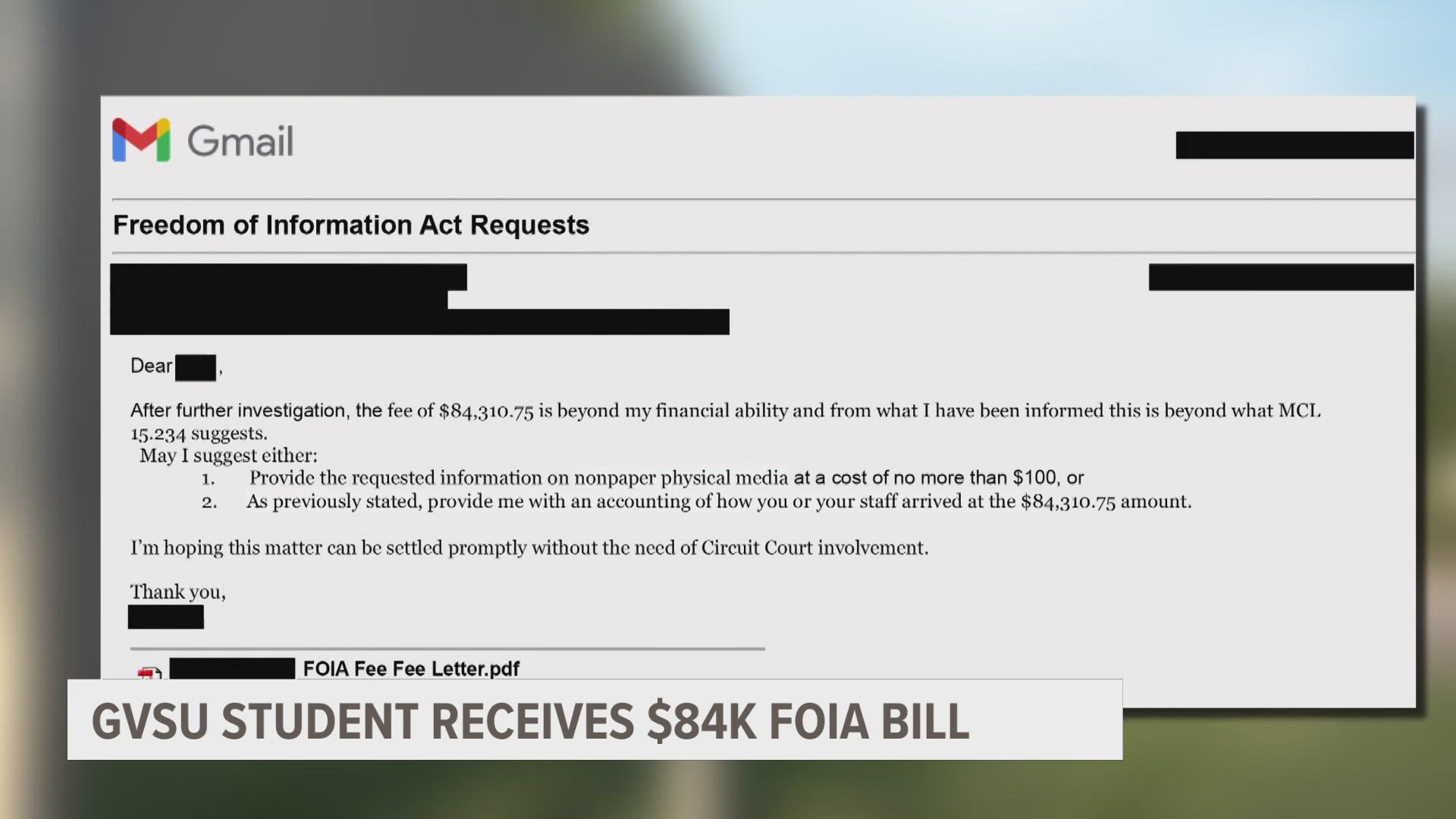Carrie Uthe’s son requested documents through the Freedom of Information Act (FOIA) in May with Grand Valley State University to get documents related to an ongoing investigation.
When Uthe’s son, who wanted his mother to speak to us on his behalf, got the bill, he was shocked. To get the documents, he would have to pay over $84,000.
“They did give us a documentation to show that breakdown, but that still made no sense, and I've shared that with several people to see if we can educate ourselves in this process,” Uthe said. “And it hasn't made no one has been able to figure out how they came. Related to $84,000.”
The Freedom of Information Act (FOIA) allows the public to request information from any federal agency, with nine exemptions. With FOIA, there are no initial fees but there can be a charge to access the documents due to labor costs, printing fees, or excessive search and collection time.
Uthe said her son was only asking for documentation. She feels like without the documents, her son’s claim is not well supported.
“Our son is just trying to have his voice heard and the right people to be addressed in their behaviors that are poor choices that they've made,” she said.
Her son asked if he could pay a more nominal amount since he can’t afford the cost of the documents. She said he hadn’t heard back.
“It's been very stressful for him. It has really played on him hard. He just wants to go to school. He wants to do well. He wants to get an education,” she said. “This has been quite a different education.”
Mike Walsh, an attorney and adjunct faculty member at GVSU who is not involved with the case, said he’s never seen a bill that large.
“Government agencies have a right to charge for their time and service to provide records, but the whole spirit of the law is to open things up, to share records with the true owners, which is you and me,” Walsh said.
He said that sometimes, entities who are providing the documents have vague, unclear requests and they have to respond in the broadest sense.
“So that could be a huge amount of money, but that's why your request has to be specific,” he said. “You know, I want records that were developed between this date and that date, dealing only with such and such, and that's pretty precise.”
If the cost of the documents is heavy, like this one, Walsh said there are options to lower the cost. If available, he said to sit down with the clerical worker and figure out what documents are necessary and what documents are not.
“The requester could very easily ask to sit down and review it, and that takes the burden off,” he said.
But Walsh also questions why the documents cost over $84,000.
“Why is this so expensive? You know, the whole point of the law is to share is to make things open to the public. It's one of our Sunshine laws. Let the sunshine in, and let's look at all this stuff,” Walsh said. “So obviously that's daunting for anybody to get a bill for $84,000 and it prevents people from going on to the next step of litigating or whatever they're going to do to get things worked out. So that's, that's why I find it troubling.”
The government works for the people, Walsh said, so we have the right to question why a request costs so much money.
Although it was unknown what would need to be redacted from the documents, Walsh said the "review directly associated with the separating and deleting of exempt from nonexempt information,” which makes up $84,001.97 of the total $84,310.75 bill, could get pricey.
“You know, it's one thing to say, okay, here are all the files we have that are responsive. That's pretty easy to do, but if they suspect there's something that needs to be exempted there, that opens up a whole other can of worms, because what is exempt, and certain confidential information is exempt can be so I'm not sure exactly what exemptions they're looking for, and I would want to know what that is,” Walsh said. “And so that's the very first hurdle.”
Uthe wishes her son could get the documents without the financial hurdle.
“And to have these documents would help support his claim of what he's made. I mean, he didn't make a false claim,” Uthe said. “He's made a claim with substance, and these additional documents would provide that additional support to hopefully put it in his favor, and that's what he's looking for. You know, he's a victim.”
Grand Valley State University said the following in a statement to 13 ON YOUR SIDE:
“Grand Valley used its normal process in calculating the fee for this request. The request is very broad would involve more than 59000 emails over a specified period. Fulfilling the request would require a qualified employee to sort through each individual email and attachment to search for and redact protected and personal information. Our FOIA officer has offered potential strategies that could narrow the inquiring party’s search to help reduce costs.”

